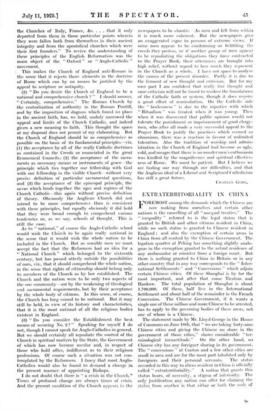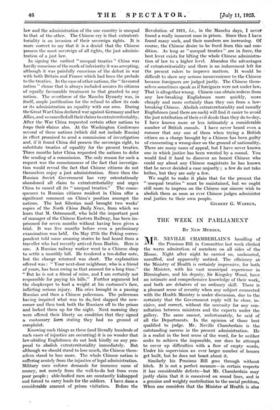EXTRATERRITORIALITY IN CHINA F OREMOST among the demands which the Chinese
are now making from ourselves and certain other nations is the cancelling of all " unequal treaties." The " inequality " referred to is the legal status that is granted to British and other citizens resident in China, while no such status is granted to Chinese resident in England ; and also the exemption of certain areas in China from all control by the Chinese Government. The legation quarter at Peking has something slightly analo- gous in the exemption granted to the actual residence of any ambassador or minister from a foreign court. But there is nothing granted to China in Britain or in any other country that in any way corresponds to the " Inter- national Settlements " and " Concessions " which adjoin certain Chinese cities. Of these Shanghai is by far the most important, and after that come Tientsin and Hankow. The total population of Shanghai is about 1,700,000. Of these, half live in the International Settlement and about half of the remainder in the French Concession. The Chinese Government, if it wants a single one of these million and more Chinese to be arrested, has to apply to the governing bodies of these areas, not one of whom is a Chinese.
The statement made by Mr. Lloyd George in the House of Commons on June 18th, that " we are taking forty-nine Chinese cities and giving the Chinese no share in the government of those cities," shows considerable " ter- minological inexactitude." On the other hand, no Chinese city has any foreigner sharing in its government. The " concessions " at Canton and a few other cities are small in area and are for the most part inhabited only by foreigners and their personal servants. The status accorded in this way to aliens resident in China is officially called " extraterritoriality." A nation that grants this status bears, of necessity, a stigma of inferiority. The only justification any nation can offer for claiming the status from another is that either or both the code of law and the administration of the one country is unequal to that of the other. The Chinese cry is that extraterri- toriality is an invasion of their sovereign rights. It is more correct to say that it is a denial that the Chinese possess the most sovereign of all rights, the just adminis- tration of a just law.
In signing the earliest " unequal treaties " China was hardly conscious of the mark of inferiority it was accepting, although it was painfully conscious of the defeat in war with both Britain and France which had been the prelude to the treaties. In the case of other nations, the " favoured nation " clause that is always included assures its citizens of equally favourable treatment to that granted to any nation. The overthrow of the Manchu Dynasty was, in itself, ample justification for the refusal to allow its code or its administration an equality with our own. During the Great War China declared war against Germany and her Allies, and so cancelled all their claims to extraterritoriality. After the War China requested certain other nations to forgo their claims also. At the Washington Conference several of these nations (which did not include Russia) in effect promised to send a commission of investigation and, if it found China did possess the sovereign right, to substitute treaties of equality for the present treaties. Three months later China requested the nations to defer the sending of a commission. The only reason for such a request was the consciousness of the fact that investiga- tion would reveal the fact that Chinese citizens do not themselves enjoy a just administration. Since then the Russian Soviet Government has very ostentatiously abandoned all claim to extraterritoriality and urges China to cancel all its " unequal treaties." The conse- quences to Russian citizens resident in China offer a significant comment on China's position amongst the nations. The last Siberian mail brought two weeks' copies of the North China Daily News, from which we learn that M. Ostroumoff, who held the important post of manager of the Chinese Eastern Railway, has been im- prisoned for seven months without having been given a trial. It was five months before even a preliminary examination was held. On May 27th the Peking corres- pondent told some amazing stories he had heard from a traveller who had recently arrived from Harbin. Here is one. A Russian railway worker went to a Chinese shop to settle a monthly bill. He tendered a ten-dollar note, but the change returned was short. The explanation offered was : " Your next-door neighbour, who is a friend of yours, has been owing us that amount for a long time." " But he is not a friend of mine, and I am certainly not responsible for paying his bills." Further argument led the shopkeeper to hurl a weight at his customer's face, inflicting serious injury. His cries brought in a passing Russian and then a Chinese policeman. The policeman having inquired what was to do, first slapped the new- comer and then took both the Russians off to the prison and locked them up for the night. Next morning they were offered their liberty on condition that they signed a customary form stating they had no ground of complaint.
Knowing such things as these (and literally hundreds of such cases of injustice are occurring) it is no wonder that law-abiding Englishmen do not look kindly on any pro- posal to abolish extraterritoriality immediately. But although we should stand to lose much, the Chinese them- selves stand to lose more. The whole Chinese nation is suffering acutely from the injustice of legal administration. Military men enforce demands for immense sums of money, not merely from the well-to-do but from even poor people ; able-bodied men are constantly kidnapped and forced to carry loads for the soldiers. I have done a considerable amount of prison visitation. Before the Revolution of 1911, i.e., in the Manchu days, I never found a really innocent man in prison. Since then I have found many such, and their numbers are increasing. Of course, the Chinese desire to be freed from this sad con- dition. As long as " unequal treaties " are in force, the best lever exists for lifting the whole Chinese administra- tion of law to a higher level. Abandon the advantages of extraterritoriality and there is no inducement left for. the present rulers to improve matters. It would be - difficult to show any serious inconvenience to the Chinese because foreigners are judged justly. The Chinese them- selves sometimes speak as if foreigners were not under law. That is altogether wrong. Chinese can obtain redress from any law-breaking Englishman more quickly, more cheaply and more certainly than they can from a law- breaking Chinese. Abolish extraterritoriality and rascally Englishmen (and there are such) will find it easier to avoid the just retribution of their evil deeds than they do to-day. I have known more or less intimately a considerable number of British consuls. I have never heard even a rumour that any one of them when trying a British citizen on a charge brought by a Chinese has been guilty of exonerating a wrong-doer on the ground of nationality. There are many cases of appeal, but I have never known one in which justice has been wrested by a consul. You would find it hard to discover an honest Chinese who could say about any Chinese magistrate he has known that he never decided a case unjustly ; a few do not take bribes, but they are only a few.
We ought to make it plain that for the present the unequal treaties " must be maintained, but we ought still more to impress on the Chinese our sincere wish to abolish them as soon as ever Chinese judges administer real justice to their own people.
GILBERT G. WARREN.



























































 Previous page
Previous page